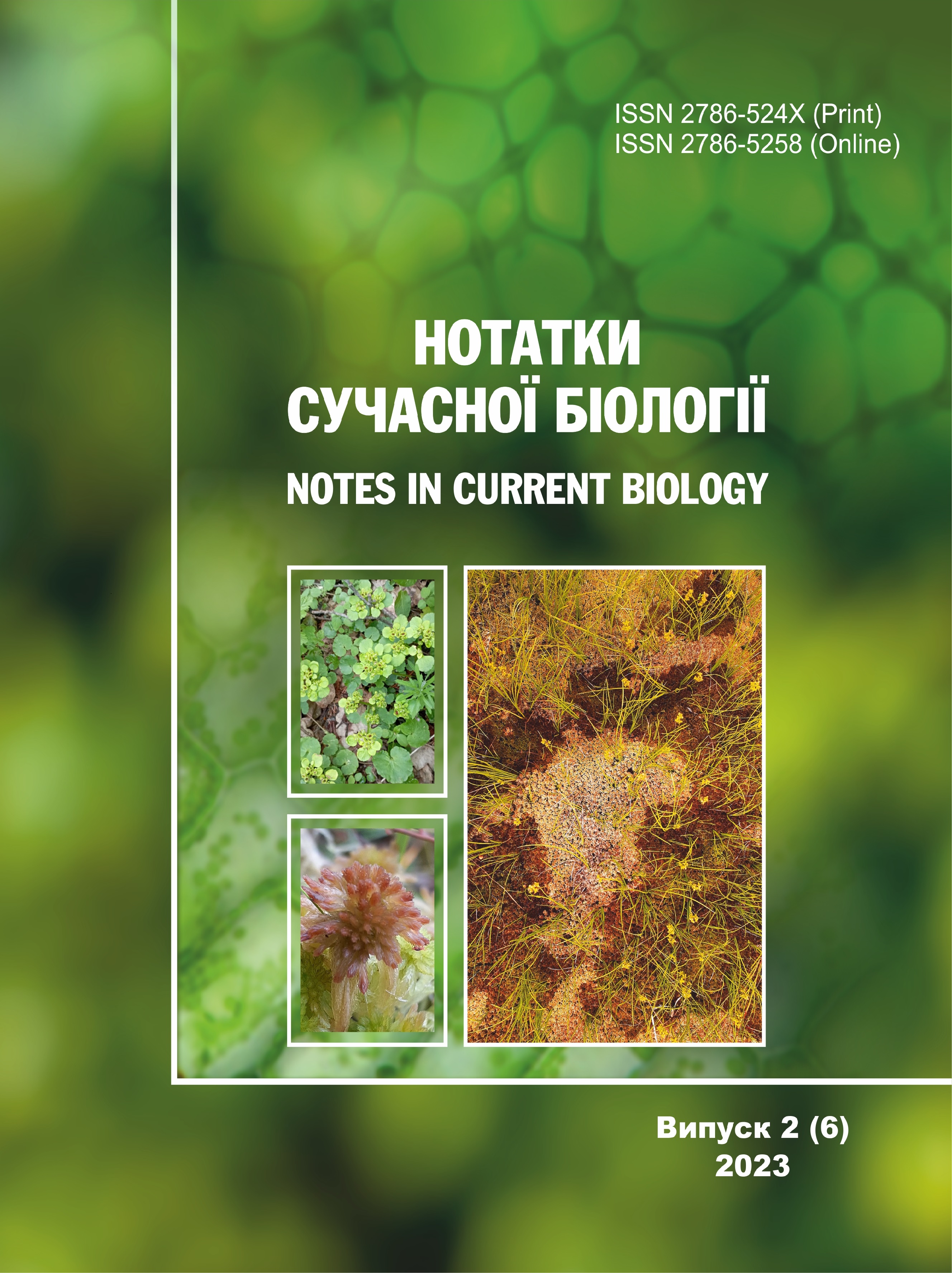Macromycetes of "Hutsulshtyna" National natural park and their antibacterial properties.
DOI:
https://doi.org/10.29038/NCBio.23.2-2Keywords:
Ксилотрофи, мікоризозалежні гриби, гумусові сапротрофи, антибактеріальна активність, каталазна та супероксиддисмутазна активністьAbstract
The ability of ethanol extracts of 20 species of macromycetes to inhibit the growth of bacterial cultures was studied. Their influence on indicators of superoxide dismutase and catalase activities in relation to three types of test cultures of microorganisms was established. Extracts of Cantharellus cibarius, Grifola frondosa Laetiporus sulphureus, Leccinum scabrum, Mycena leptocephala, Russula rosea, Strobilomyces strobilaceus showed the largest diameters of growth retardation of microorganisms of test cultures. The ability to counteract bacteria is a species-specific feature and does not depend on the trophic timing of macromycetes, the same applies to the ability to suppress the catalase activity of microorganisms. Extracts of macromycetes, which provoked inhibition of the growth of cultures, led to changes in the SOD activity of the studied bacteria: during incubation of M. luteus culture with mushroom extracts, which showed an inhibitory effect on the growth of microorganisms with a diameter of 8-12 mm, superoxide dismutase activity increased 2-3 times, during incubation of M. luteus bacteria with extracts that inhibited growth with a diameter greater than 12 mm, the enzymatic activity increased 8-10 times. The SOD activity of B. spizizeni increased by 40-80% at the 24th hour of the experiment with extracts, the use of which is accompanied by the formation of a 10 mm zone of growth inhibition, but already after 48 hours of the experiment, the indicators of the SOD activity of B. spizizeni decreased to the control values. SOD activity of E. coli increased on the 24th hour of the experiment by 1.4-1.6 times relative to the control values, even with the use of extracts that provoked inhibition of the growth of cultures with a diameter of 8 mm and remained high on the 48th hour of the experiment (in 1.2-1.3 times).
References
. Dai, YC, Cui, BK, Si J, He, SH et al. − Dynamics of the worldwide number of fungi with emphasis on fungal diversity in China. Mycology Progress. 2015, 14(62), 1–9.
Kopylchuk, H., Voloshchuk, O., Pasailiuk, M. Comparison of total aminoacid compositions, total phenolic compounds, total flavonoid content, β-carotene content and hydroxylradical scavenging activity in four wild edible mushrooms. Italian Journal of Mycology, 2023, 52(1), 112–125.
Zerova, M. Ya., Yelin, Yu. Ya., Koziakov, S. M. Hryby: yistivni, umovno yistivni, neistivni, otruini [Fungi: edible, conditionally edible, inedible, poisonous]. – Kyiv: Urozhai, 1979. – 232 s. (in Ukrainian)
Diduh, Ja.P. Chervona knyga Ukrai'ny. Roslynnyj svit. K.: Globalkonsaltyng, Kyi'v, 2009; s 799, 801, 802, 804, 813, 817, 819, 825, 829. (in Ukrainian)
Shalaj, Ja.R. Rol' vil'no radykal'nyh procesiv u antyneoplastychnij aktyvnosti pohidnyh tiazolu [The role of free radical processes in the antineoplastic activity of thiazole derivatives]. -. – dys. na zdobuttja d-ra filosofii'., L'viv, 2019, 151 s. . (in Ukrainian)
Kompanec', I.V., Ostapchenko, L.I. Doslidzhennja membrannyh bilkiv ta lipidiv: Navchal'nyj posibnyk [Study of membrane proteins and lipids: Study guide] (dlja studentiv NCC «Instytut biologii'»), 2013. – 159 s. . (in Ukrainian)
Quereshi, S.; Pandey, A.K.; Sandhu, S.S. Evaluation of antibacterial activity of different Ganoderma lucidum extracts. PJSR 2010, 3, 9–13.
Sułkowska-Ziaja, K.; Trepa, M.; Olechowska-Jarząb, A.; Nowak, P.; Ziaja, M.; Kała, K.; Muszyńska, B. Natural Compounds of Fungal Origin with Antimicrobial Activity—Potential Cosmetics Applications. Pharmaceuticals 2023, 16, 1200. https://doi.org/10.3390/ph16091200
Barros, L., Venturini, B.A., Baptista, P., Estevinho, L.M., Ferreira, I.C.F.R. Chemical composition and biological properties of Portuguese wild mushrooms: A comprehensive study. J. Agric. Food Chem. 2008, 56, 3856–3862.
Turkoglu, A., Duru, M.E., Mercan, N., Kivrak, I., Gezer, K. Antioxidant and antimicrobial activities of Laetiporus sulphureus (Bull.) Murrill. Food Chem. 2006, 101, 267–273.
Bysko N.A., Babyckaja V.G., Buhalo A.S., Кrupoderova T.A., Lomberg m.L., Myhajlova O.B., Puchkova T.A., Solomko Э.F., Shherba V.V. Byologycheskye osobennosty lekarstvennыh makromycetov v kulture: Sbornyk nauchnыh trudov v dvuh tomah. T. 2. pod red. S.P. Vassera) Kyev, 2012. – 459 s.
Kapoor, G., Saigal, S., Elongavan, A. Action and resistance mechanisms of antibiotics: A guide for clinicians. J Anaesthesiol Clin Pharmacol. 2017 33(3):300-305. doi: 10.4103/joacp.JOACP_349_15.
Lushhak, V.I. Okysljuval'nyj stres i mehanizmy zahystu vid n'ogo u bakterij [Oxidative stress and mechanisms of protection against it in bacteria.]. Biohimija. 2001. – T. 66. – S. 592 – 609. . (in Ukrainian)
Kolupajev, Ju. Je., Oboznyj, O. I. Aktyvni formy kysnju i antyoksydantna systema pry perehresnij adaptacii' roslyn do dii' abiotychnyh stresoriv [Reactive oxygen species and the antioxidant system during cross-adaptation of plants to the action of abiotic stressors.]. Visnyk Harkivs'kogo nacional'nogo agrarnogo universytetu. Serija biologija. 2013. Vyp. 3 (30). S. 18 – 31. . (in Ukrainian)
Imlay JA. The molecular mechanisms and physiological consequences of oxidative stress: lessons from a model bacterium. Nat Rev Microbiol. 2013 Jul;11(7):443-54. doi: 10.1038/nrmicro3032. Epub 2013 May 28. PMID: 23712352; PMCID: PMC4018742.
Furtat I.M., Kunycja N.I. Vplyv umov kul'tyvuvannja na katalaznu aktyvnist' shtamu Corynebacterium ammoniagenes UKM As-732 [Effect of cultivation conditions on catalase activity of Corynebacterium ammoniagenes strain UKM As-732.]. Naukovi zapysky. Biologija ta ekologija. 2010. – T. 106. – S. 33 – 37.
Margino S., Martani E., MagdalenaM. Superoxide Dismutase of Micrococcus sp. S2 and its Involve in Paraquat Detoxification// Indonesian Journal of Biotechnology. 2007. – Vol. 12, № 1. – P. 973 – 979.
Downloads
Published
Issue
Section
License
Copyright (c) 2024 Марія Пасайлюк, Леся Пліхтяк

This work is licensed under a Creative Commons Attribution-NonCommercial 4.0 International License.





